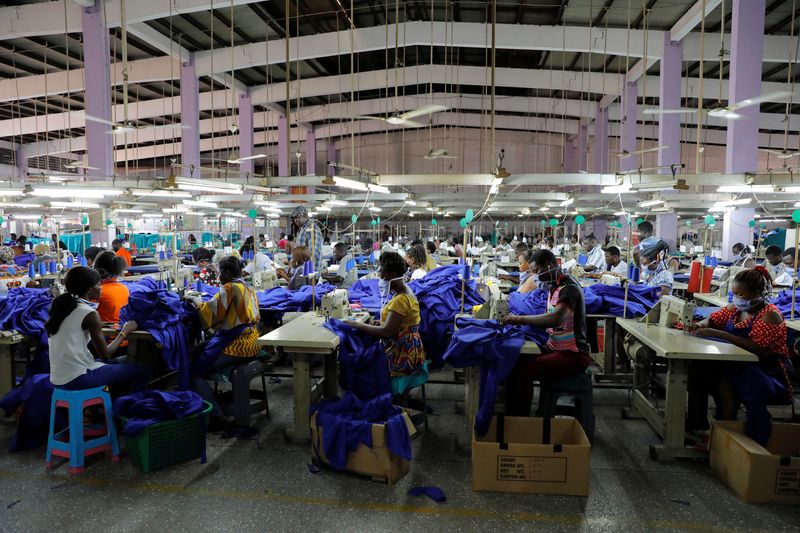By Vuyani Ndaba
JOHANNESBURG (Reuters) - The recovery in sub-Saharan Africa's major economies will gain little traction this year as weak local currencies undermine a boost to export earnings from high commodity prices, a Reuters poll found on Thursday.
The potential for gross domestic product growth to make a meaningful reduction in overblown budgets is in question as some of Africa's biggest economies, including Angola, Ghana and Nigeria, borrow mostly in dollars against weak currencies.
In an April 19-26 poll, the median forecasts of economists and analysts suggested growth in Nigeria, Africa's biggest economy, would be 3.1% this year and 3.2% next year.
Two months ago, Nigeria's statistics agency reported its fastest growth in seven years in 2021 despite a slight slowdown in the fourth quarter following problems in the oil sector. Full-year growth stood at 3.4% last year, its fastest rate since 2014.
Capital Economics wrote in a note that "recoveries across sub-Sahara have been underwhelming".
Turning to Nigeria, the note said: "We doubt that higher export revenues will prompt policymakers to move away from draconian FX restrictions that are hindering activity and pushing inflation up."
With elections scheduled for early 2023, against the background of a relatively high oil price in 2022, the focus was likely to be on politics, not reform and economic policy, David Cowan of Citi wrote.
Kenya's and Ghana's economies were expected to grow by 5.0% and 5.1% this year, more or less in line with last year's performances compared to World Bank estimates. However, Ghana is battling debt management problems.
Kenya and Ghana were expected to grow 5.5% and 5.1% next year respectively.
Ghana's economy grew 5.4% in 2021, the country's statistics agency said last week, marking a rebound from the lows of the COVID-19 pandemic while staying within growth estimates.
The West African country's gross domestic product grew 7% year on year in the fourth quarter, largely due to increased agricultural production although the industrial sector contracted.
The World Bank said the sub-Saharan Africa economy was set to grow 3.6% this year, down from 4.0% in 2021 and said rising food and energy prices fuelled by Russia's war in Ukraine could spark civil unrest in the region.
Capital Economics added that spillovers from the war in Ukraine would have a varied impact across Africa. Angola and, to a lesser extent Nigeria, will benefit from high oil prices which should allow for looser fiscal policy.
The poll expects Angola to grow 2.8% this year and next after World Bank estimates of 0.4% growth last year.
A poll earlier this month found growth in South Africa, the continent's second biggest economy, was expected to slow markedly to 1.9% this year from a 4.9% expansion last year. It was expected to expand just 1.8% next year. [ECILT/ZA]
Its budget has somewhat benefited from higher commodity prices and debts are priced in the rand, which strengthened in recent months.
Nigeria, South Africa and Angola make up more than half of sub-Saharan Africa's economy.
(For other stories from the Reuters global long-term economic outlook polls package)
